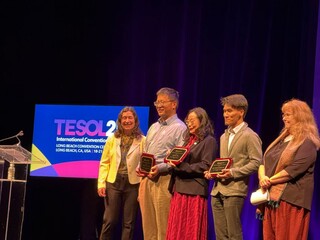EdUHK English Language Education Programme Gives All-round Training to Aspiring Primary School English Teachers
- 28 Mar, 2023
- Feature Stories
- Faculty of Humanities
To nurture a new generation of professional and confident prospective English teachers, learning and training opportunities should be planned well ahead. “We hope that by the time they graduate, our students are proficient in English and have broad horizons,” said Dr Fung King Tat Daniel, Programme Leader of Bachelor of Education (Honours) (English Language) at The Education University of Hong Kong (EdUHK).
To enable students to experience the local culture as well as to improve their competencies in spoken English, they will participate in the Immersion Programme held in English-speaking countries in the summer semester of their Year 3 studies. While they were abroad, the EdUHK teaching staff would visit the students. This Immersion Programme has received positive feedback from students. “And our Immersion Programme is unlike ordinary exchange opportunities – we make agreements with overseas universities to ensure that the courses include cultural elements, which are essential to our students’ language development,” Dr Fung added. “This aims at allowing our students to better engage with their local counterparts, and to understand the local education system more.”
Field Experience Opportunities with a Focus on Primary School Education
The first two years of this five-year full-time programme are similar to traditional English majors, which involve literature and linguistics courses that aim at laying a good foundation for students’ English competencies. From Year 3 onwards, students need to take more courses related to pedagogy to understand the role and expectations of teachers, what teaching is about, and how to plan the lessons, etc. The programme provides opportunities for teaching demonstrations, such as microteaching, to prepare students for their teaching practice.
In addition, students enrolled in the programme will have field experience opportunities. They can practise teaching in local primary schools to gain teaching experience. “Students are required to develop a learning portfolio for their teaching practice for self-reflection purposes,” said Dr Fung. Students are expected to teach at local schools for eight weeks in Year 3 and 13 weeks in Year 5 to put what they have learned into practice and to strive for improvement after reflecting on their own shortcomings.
Classroom Learning Becomes Crucial due to the Lack of Everyday English Exposure
For most local students and teachers, English is not their native language, and it is inevitable that they face challenges in learning and teaching. Since many students lack daily exposure to English, they will need to make extra efforts to improve their English competency, such as developing reading and listening habits, and learning new vocabulary on a regular basis, Dr Fung remarked.
“After all, how many English lessons can there be in a week? Many students simply stop using English once the bell rings. Under these circumstances, how much students can learn depends on their classroom learning and the teacher’s ability to motivate students to speak English,” Dr Fung explained.
Raising questions can be a great challenge to teachers. “If the question is raised in a way in which students find it too simple, they won’t bother to answer. So, when the students give no response, the teacher should encourage them to speak using a different method. You have to give it your all to encourage students to use the language more,” Dr Fung chuckled.
Grammar-based Contextual Teaching Transcends Traditional Pedagogy
Grammar took centre stage in traditional English pedagogy. Hong Kong students memorised the verb conjugations for various tenses and aspects, such as the simple present, the simple past, and the present progressive perfectly. However, whether they could put them into practice is another issue.
“Sometimes students use unidiomatic English because they are not aware of the linguistic context, and that good usage goes beyond forming correct sentences,” Dr Fung said.
Therefore, how can teachers create a fun learning environment? He shared an example of how a teacher made use of the hype around the World Cup and asked the students to create a theme song for it. This idea not only promotes sportsmanship among students, but is also a fun way to learn English.
Nurturing All-round Talents in Education and English Language
The programme aims at training students to be competitive English teachers or English language-related professionals. Students can choose electives according to their career aspirations. These include pedagogy and counselling in special education. Also, there are also subjects that prepare students to teach at international schools. Taking last year’s cohort as an example, more than 90% of the employed graduates worked in the education sector and took a leading role in nurturing our future generation.
Dr Fung expressed that there is a new initiative since last summer that provides internship opportunities for students to take up administrative roles in a school setting. This initiative aims at familiarising students with school operations, which is essential to their future teaching careers.
In addition, students will have achieved high proficiency in English upon completing the programme. Apart from the education sector, students are also well-equipped to engage in sectors such as civil services, journalism, and publishing.
- Programme Information
- Bachelor of Education (Honours) (English Language) - Primary
- BA (Hons) in Language Studies (Chinese Major/English Major)
- Bachelor of Arts (Honours) in Language Studies and Bachelor of Education (Honours) (English Language) (Co-terminal Double Degree)
- Bachelor of Arts (Honours) in English Studies and Digital Communication






